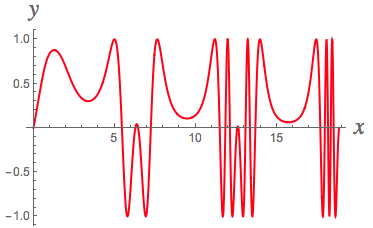Let #y=x^{cos(x)}# and #z=sin(y)=sin(x^{cos(x)})#. You'll need to first find #dy/dx# before using the Chain Rule to find #dz/dx=dz/dy*dy/dx#.
Find #dy/dx# by using logarithmic differentiation (which also involves implicit differentiation). Since #y=x^{cos(x)}#, we can also write #ln(y)=ln(x^{cos(x)})=cos(x)ln(x)#, where the last equality is a property of logarithms.
Now differentiate both sides of this last equation with respect to #x# (keeping in mind that #y# is a function of #x#) and using the Chain Rule and Product Rule to get #1/y*dy/dx=-sin(x)ln(x)+cos(x)/x# so that #dy/dx=y(cos(x)/x-sin(x)ln(x))=x^{cos(x)}(cos(x)/x-sin(x)ln(x))#
Since #dz/dy=cos(y)=cos(x^{cos(x)})#, the Chain Rule (of the form in the first paragraph) can now be brought to bear to conclude that
#dz/dx=cos(x^{cos(x)})*x^{cos(x)}(cos(x)/x-sin(x)ln(x))#.
That's the answer.
Here's what the graph of #sin(x^(cos(x)))# looks like (for #0 < x < 6\pi#), in case you were wondering:


